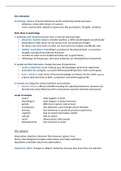Ch1: the basics
Psychology: science of human behaviour and its underlying mental processes.
- behaviour: observable actions of a person
- mind: unobservable subjective experiences like perceptions, thoughts, emotions.
Basic ideas in psychology
1: behaviour and mental processes have a material, physical origin
Descartes’ dualism: body is complex machine, a reflex would happen just physically
pineal gland is little house for the human soul, soul produces thought
his theory sets strict limits on what can and cannot be studied scientifically; bad
Hobbes’ materialism: everything is a product of the physical brain, so conscious
thought is produced by material structures
no limits on what can be studied and what not; so good theory
reflexology: by Russian guy, all human behaviour are stimulated by environment
2: people and their behaviour changes because of experiences
Locke’s empiricism: brain is tabula rasa, all knowledge comes from experience
association by contiguity: successful following building blocks (red+round=apple)
Kant’s nativism: basic forms of human knowledge are inborn into the mind (opposite)
a priori: built into brain at birth, a posteriori: learned throughout life
3: humans are shaped by natural selection and evolution
Darwin’s theory offered scientific founding for explaining behaviour, because only
the behaviour that fitted best with environment would be inherited and learned
Levels of analysis
- neural what happens in brain
- physiological what happens in body, hormones
- genetic difference in genes, look at twins
- evolutionary why behaviour came though natural selection
- learning how behaviour is caused by previous experiences
- cognitive look at mental information, beliefs
- cultural look at culture
- social influenced by other people
- developmental how someone is raised
Ch2: research
observation: objective statement that observers agree is true
theory: idea designed to explain observations and make predictions
hypothesis: prediction about new observations
Hawthorne effect: changes in subjects’ behaviour because they know they are watched
, Good research
- value of scepticism: doubting claims and trying to disprove them
- testing hypotheses, you should control the conditions carefully, so you can rule out
alternative explanations, confounds
- watch out for observer-expectancy effect: subjects of study perceive (unconscious)
cues from observers bad study
- the less random variation (always random factors influencing measurement, this is
measurement error) in the results, the more reliable they are
- lab study: good control over the conditions, but behaviour might be influenced
- field study: less control, but more natural behaviour
scientific experiment: independent variable is manipulated, dependent variable is
measured (within-subject: one thing is studied repeatedly, between-groups: duh)
does x cause y ?
correlational study: observing 2 measures and looking for a relationship
is there a correlation between x and y ?
descriptive study: observe behaviour without assessing a relationship
what is x ?
In order to draw a conclusion about a whole group, you need a representative sample of
people of that whole group. Not a biased sample! If you test something about people with
insomnia, you need a group with people who don’t all have the same amount of insomnia
but all different complaints and sorts of insomnia, because if you run a test only with people
with severe insomnia then you can only say something about people with a certain kind of
insomnia.
Subject-expectancy effect / placebo-effect: the participant’s expectations can affect the
outcomes. The patient getting a placebo treatment but thinks it’s the real treatment might
believe it works and mentally affect the results.
Observer-expectancy effect: the observer/experimenter treat the patients in different
groups differently so they influence the outcome as well.
Correlation is not the same as causality: if A gets bigger and B gets smaller, doesn’t mean
that A is causing B to get smaller, might be just coincidence or a third variable influencing the
both of them. So when correlational research, don’t say causes/has an effect/influences but
just say the facts and this might be caused by ….
Ch3: genes
Genes affect your behaviour by determining the bodily structures involved in behaviour
coding genes: code for unique protein molecules
regulatory genes: activate and suppress specific coding genes, environmental
effects also help to turn genes on and off (epigenetics)
Environment: every aspect of an individual + surroundings but the genes themselves





